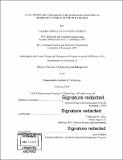Challenges and strategies for increasing adoption of renewable energy in the MENA region
Author(s)
Zureikat, Yazeed Abdullah Ghanem.
Download1103607380-MIT.pdf (8.925Mb)
Other Contributors
Massachusetts Institute of Technology. Engineering and Management Program.
System Design and Management Program.
Advisor
Michael W. Golay.
Terms of use
Metadata
Show full item recordAbstract
Power demand is experiencing strong growth in the MENA region, while local fuel resources are depleting. Traditional sources of power no longer meet the demands of an environmentally sensitive future. Meeting the rapidly growing domestic energy demand, particularly for electricity and desalination, is a real challenge facing all MENA countries. Renewable energy will play a key role in the MENA region's sustainable energy transition, and should be viewed as an integrated solution for water and energy. This thesis presents an overview of the challenges associated with adopting renewable energy on a large scale, and proposing potential solutions that are most suited for the needs of the MENA region. The main challenge being evaluated in this work is the concept of curtailed energy risk as a result of the intermittency associated with the adoption of renewable energy. Storage technologies, such as pumped hydro and battery storage, are the most common solution for this challenge. However, this report proposes the use of desalination to solve both curtailment and the critical need for water in the region, while also reducing the negative effects of economic uncertainty associated with battery storage adoption. A Strategy was proposed for adopting large scale battery energy storage within uncertainty. This research used two methodologies for the analysis. System causal loop modeling, which was used to understand the complex behavior when utilizing curtailed energy for desalination and storage, and excel modelling using a probabilistic cost-benefit analysis that was employed to apply flexibility to the adoption of battery storage capacity, and increasing the expected net present value.
Description
Thesis: S.M. in Engineering and Management, Massachusetts Institute of Technology, System Design and Management Program, 2019 Cataloged from PDF version of thesis. Includes bibliographical references (pages 78-82).
Date issued
2019Department
Massachusetts Institute of Technology. Engineering and Management ProgramPublisher
Massachusetts Institute of Technology
Keywords
Engineering and Management Program., System Design and Management Program.